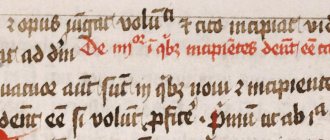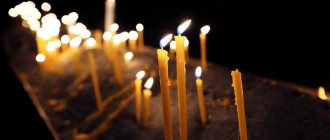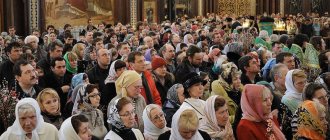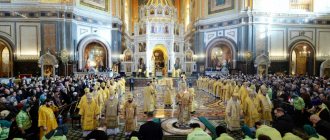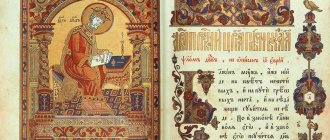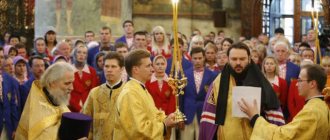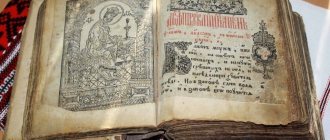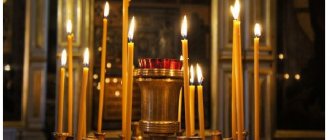Sometimes a person who has only recently started going to church and wants to pray for his family and friends gets lost in the various names of church notes: about health, about repose, for proskomedia, magpie, prayer service, requiem, akathist... How to write them correctly, and most importantly, For what? Isn't it enough to just light a candle and pray for your loved ones in your own words? Why is there a donation fee for prayer? Priest Alexy Savin, cleric of the Holy Trinity Cathedral in Pokrovsk (Engels), talks about this.
Prayer for neighbors, living and deceased, is the duty and responsibility of every Christian. Since ancient times, pious families, where Christian traditions were respected, started a memorial book - a special book in which not only the names of living and deceased relatives were recorded, but also their dates of birth, days, and sometimes the circumstances of their death. Thus, the memorial became a kind of chronicle of the family, passed down from generation to generation. Memorial books can still be purchased in churches or Orthodox book stores.
Monasteries and churches have their own memorial books, or synodics, in which the names of clergy, residents of monasteries, ktitors, and parishioners are written down. The church note that we submit in church about health or repose is, in essence, a one-time memorial. Memorials and notes, both in their appearance and in their use, can be called liturgical books: after all, the Holy Cross is depicted on them, they are brought into the altar, and read during the Divine Liturgy before the Holy See.
In ancient times, Orthodox Christians brought bread, wine, candles, and oil to the temple for worship. Today we write notes and make a small, modest donation for them, by giving which we help to purchase everything necessary for the performance of worship.
"To the Proskomedia"
The notes “On health” and “On repose” are read by the clergy at the altar at the proskomedia - the first part of the Divine Liturgy, during which the Holy Gifts are prepared for the Sacrament of the Eucharist. During the proskomedia for those people whose names are written in the note, the priest takes particles from the prosphora and at the end of the Liturgy lowers these particles into the Holy Chalice, which contains the Body and Blood of Christ, with the prayer: “Wash away, Lord, the sins of those who are remembered here with Your Blood Honest, through the prayers of Your saints." By performing this sacred rite, the grace of the Holy Spirit is given to the souls of people commemorated according to the notes.
At this time in the temple the reader reads the 3rd and 6th hours. Believers should understand how important the moment is happening at this time in the altar, and try to pray carefully, remembering their living and deceased relatives.
Sometimes in a church you can find separate notes for the proskomedia and a separate “mass” service. Mass is popularly called Liturgy. A customized mass is a commemoration made from notes during the Liturgy. Such notes are read at the proskomedia, at the litany and at the prayer service (or memorial service).
Question and answer
Can an unbaptized person submit a note for the repose of a deceased Orthodox Christian?
You can submit a note. It is only necessary that the one whose name is inscribed in it be baptized in Orthodoxy.
What to do if it is not known for sure whether the deceased was baptized?
In such difficult cases, it is best to consult with the priest.
Is it even possible to pray for the repose of the unbaptized?
Such prayer is permitted, but only in private, in private.
"About health"
The concept of “health” includes not only the physical, but also the spiritual state of a person. In this note we should write down the names of baptized people to whom we wish health, salvation and prosperity.
First you need to write the name of His Holiness the Patriarch, and after him the ruling bishop, who takes care of the flock entrusted to him and brings prayers to the Lord for them. Then the name of the spiritual father, the priest to whom the person confesses, is written. In this way we fulfill the covenant: Remember your teachers (Heb. 13:7). Then write the names of the parents, your own name, the names of family members, loved ones and relatives.
Finally, if a person has an ill-wisher, an offender or even an enemy, you can write down his name for prayerful remembrance, according to the commandment of the Lord: love your enemies, bless those who curse you, do good to those who hate you and pray for those who offend you and persecute you (Matthew 5:44 ). Commemoration at the Liturgy helps to achieve peace and understanding with this person.
"On Repose"
In it we write the names of our deceased relatives, friends, and everyone who is dear to us. We call our deceased departed (asleep), and not dead, because at the end of time, according to the teachings of the Church, they will rise from their graves and rise from the dead.
When communicating with the living, we constantly remember them, but we remember the deceased only in the first time after death, and later... Gradually, the feeling of grief and the severity of separation weaken, and we begin to forget our loved ones. Meanwhile, the departed are waiting for our prayers, during which our unity with them is especially felt. Prayerful remembrance produces an extremely deep effect and impression on the soul of the person praying, thereby proving real communication with the souls of the dead. By diligently remembering our relatives and friends, we hope that when the time comes for us to leave this world, the people who remain in this world will remember us in their prayers.
How to properly submit notes in church
Church prayer for the living and the dead
A church note given “On health” or “On repose”, along with a candle, is the most massive church appeal of people to the Lord, the Mother of God, and the holy saints.
A note submitted without an image of a cross, written in sloppy, illegible handwriting, with many names, indicates a lack of understanding of the sacred importance and high purpose of recording the names of the living and deceased for their commemoration. Meanwhile, the notes can be called liturgical books: after all, a cross is depicted on them, they are brought into the altar, and read during the Divine Liturgy before the Holy See.
In notes submitted for commemoration, the names of only those who were baptized in the Orthodox Church are written. An eight-pointed cross is depicted at the top.
Notes with names are placed in the “candle box”, from there they are carried to the altar along with the prosphora. The priest reads the notes and takes out “memorial particles” from the prosphoras. At the end of the Liturgy, the prosphora are returned to the “box”, where they can be received after the service.
Note "about health"
The concept of “health” includes not only health, a person’s physical condition, his material well-being, but above all his spiritual condition. This note should include everyone to whom we wish health, salvation and prosperity. Everyone should pray for the health and well-being of their family: “If anyone does not take care of his own, and especially his family, he has renounced the faith and is worse than an infidel.” If you want to remember a clergyman, then his name is written first.
If you have an ill-wisher, an offender, an envious person or even an enemy, write down his name for prayerful remembrance according to the commandment of the Lord: “Love your enemies, bless those who curse you, do good to those who hate you, and pray for those who offend you and persecute you.” Prayer for enemies is a great force for ending hostility and establishing peace. The Savior himself prayed for his enemies. There are many known cases when one of the warring parties wrote the name of his ill-wisher on a health note - and the hostility stopped.
Note "on repose"
In it we write the names of our deceased relatives, friends, and everyone who is dear to us. We call our deceased departed (asleep), and not dead, because at the end of time they will rise from the grave, rise from the dead.
The most important commemoration of the living and the dead is proskomedia. At the Liturgy, the priest takes out particles from the prosphoras about the health and repose of those for whom the believers submitted notes. At the end of the Liturgy, the particles taken from the prosphora are immersed in the Holy Chalice, at which time the priest pronounces the words: “Wash, O Lord, the sins of those who were remembered here by Your honest Blood, by the prayers of Your saints.” The particles come into contact with the Body and Blood of Christ the Savior.
This is the power and effectiveness of removing parts from the prosphoras. This is not just a prayer for this or that living or dead, but the cleansing of sins by this very bloodless Sacrifice. Here each part, imbued with the Blood of the Savior, becomes an intercessor before Him for the one about whose name it was taken. That is why taking out from the prosphora a particle about someone living or dead during the Liturgy in the Orthodox Church has always been considered the most saving and fruitful action.
A reminder for those wishing to submit a note about the living or deceased
- Notes must be submitted before the start of the Liturgy or, even better, the evening before.
- When writing down the names of the living and the dead, remember them from the bottom of your heart with a sincere desire for their good, trying to think about each of those whose names you write down.
- The note should contain no more than 5–10 names. If you want to remember many of your family and friends, send a few notes.
- Names must be written in the genitive case (answer the question “who?”, for example: Alexei, Varvara).
- When writing the names of priests and bishops, their rank is indicated - for example, about the health (or repose) of Bishop Tikhon, priest (priest) Yaroslav.
- All names must be given in church spelling (for example, George, not Yuri, John, not Ivan) and in full (Alexandra, Nikolai, but not Sasha, Kolya).
- The notes do not indicate last names, patronymics, or degree of relationship.
- A child under seven years of age is referred to in the note as an infant, for example, baby Peter.
- If you want, in health notes you can mention “sick”, “warrior”, “travelling”, “prisoner” before the name.
- In the repose notes, the deceased is referred to as “newly deceased” within forty days after death. It is allowed to write before the name of the words “killed”, “warrior”, “of ever-memorable” (on the day of death or name day of the deceased) in funeral notes.
- Notes for a prayer service or memorial service, which take place after the end of the Liturgy, are submitted separately.
What is a registered note?
In some churches, in addition to ordinary notes about health and repose, custom notes are accepted.
A customized note differs from a regular commemoration in that, in addition to removing a particle from the prosphora (which happens during a regular commemoration), the deacon publicly reads the names of those commemorated, and then the priest repeats these names before the altar.
After the end of the Liturgy, a prayer is offered at the prayer service according to the order for health.
At the end of the Liturgy, a memorial service is served according to the order of the repose note.
Sorokoust
This is a commemoration that is performed by the Church daily for forty days. Every day during this period, particles are removed from the prosphora for the person commemorated.
As a rule, the magpie of repose is ordered in the very first days after the death of a Christian, often even on the very day of the funeral service. This church commemoration makes it easier for the soul to go through ordeals (judgment) after leaving the body.
“The Sorokousts,” wrote Saint Simeon of Thessalonica, “are performed in remembrance of the Ascension of the Lord, which occurred on the fortieth day after the Resurrection, and with the purpose that he (the deceased), having risen from the grave, ascended to the meeting (that is, to meet. - Ed. ) Judges, he was caught up in heaven, and so he was always with the Lord.”
Sorokousts are ordered not only for repose, but also for health, especially for seriously ill people.
You can order commemoration of the living or deceased for a month, half a year, or a year. Some churches and monasteries accept notes for eternal remembrance.
In addition to liturgical commemoration, there are other church types of prayer for loved ones:
- Prayers for the living or a prayer service, to which, at the request of the believer, blessing of water or the reading of an akathist can be added. Those wishing to serve a prayer service turn to the “candle box” before the Liturgy.
- A prayer for the dead or a memorial service is served in front of a cross standing on the funeral table (eve). Since ancient times, there has been a custom to organize a meal in memory of the deceased. People were invited to it and asked to pray for the dead. This custom is especially observed on “parental” (funeral) days.
- The prayers that are sung and read before the burial of the deceased are called funeral services.
Prayer service
A prayer service is a special service in which they ask the Lord, the Mother of God, and the saints to send mercy or thank God for receiving benefits. In church, prayer services are performed, as a rule, after the Liturgy, as well as after Matins and Vespers. A prayer service is an intense prayer for living people. Prayer services can be public or private.
Public prayers are performed on temple holidays, on New Year's, before the start of the school year, during natural disasters, during epidemics, during drought, etc.
Other prayer services relate to private worship and are performed at the requests and needs of believers. In different churches there are certain days when prayer services are held, including holy water services.
At a water blessing service you can bless a cross, an icon, and candles. At the end of the water-blessing prayer service, believers with reverence and prayer take holy water and take it daily on an empty stomach.
A note for a prayer service for health begins with the outline of an eight-pointed cross indicating which saint the prayer service is offered to. Then the names of those for whom the prayer song will be offered are listed.
When you submit a note for the prayer service, tell the minister whether you are ordering a water-blessing prayer service or a regular one, without the water-blessing.
Sometimes a person ordering a prayer service does not wait for it to be completed and leaves the temple, leaving only a note. The Lord accepts every sacrifice, but it is much more effective to pray with a priest than to leave him to beg God for us.
Memorial service
Private worship also includes a memorial service - a funeral service, a service for the deceased. Usually it is performed after prayers. Funeral services are performed according to registered funeral notes. Funeral services are performed for the deceased who have not yet been buried. It is customary to perform them on the third, ninth and fortieth day after death, on the birthdays of the deceased, name days, death and other days.
When performing a requiem service, the Holy Church focuses our attention on how the souls of the departed ascend from the earth to the Judgment to the Face of God and how with fear and trembling they stand at this Judgment and confess their deeds before the Lord.
“Rest in peace” is sung during the funeral service. The physical death of a person does not mean complete peace for the deceased. His soul may suffer, not find peace, it may be tormented by unrepentant sins and remorse. Therefore, we, the living, pray for the departed, asking God to give them peace and relief.
If you have ordered a prayer service or memorial service, you need to be present during their service and pray diligently with the priest, especially at the moment when the priest reads your note with the names of those for whom you are praying.
Funeral service for the deceased
Sharing with believers all the sad and joyful events of earthly life, the Holy Church soulfully and solemnly escorts her children to the afterlife
Usually the deceased is washed at home, dressed in everything clean and, laying him in the coffin, folds his hands on his chest in a cross shape, as a testimony of faith in the crucified Lord Jesus Christ. The deceased is covered with a special veil as a sign that he is under the grace-filled protection of the Church. A crown with the image of Christ, the Mother of God and John the Baptist is placed on the forehead of the deceased - in the image of that crown of salvation that we hope to receive in eternal life, and an icon of the Savior or the Mother of God is given into the hands.
According to ancient pious custom, the coffin is taken to the temple, placed facing the altar, candles are lit, which remind of the transition of the deceased from the dark life of the earth to the true Light. At the request of the relatives, either they themselves or the readers read the Psalter over the deceased all night in order to drive away demonic forces.
In the morning, after the funeral Liturgy, the funeral service is performed. The service consists of chants that depict the fate of man: for breaking the commandment, he returns to the earth from which he came, but without ceasing to be an image of the glory of God. Therefore, after reading the Apostle and the Gospel, which speaks of the future resurrection of the dead, the priest reads a prayer of permission, in which the Church prays to the Lord to forgive the deceased’s sins and to make him worthy of the Kingdom of Heaven. The text of the prayer is placed in the hand of the deceased. This is how the loving Mother Church says goodbye to her child - forgiving him herself and prayerfully placing him in the hands of the merciful Lord.
Unfortunately, today funeral services for the deceased are often performed in absentia. Of course it's easier this way. However, neither in terms of benefits for the soul of the deceased, nor in terms of the power of impact on the living, such a funeral service can be compared with an in-person one.
The days on which it is especially necessary to remember the dead are the third, the ninth, when, according to the teachings of the Church, the soul appears before the heavenly Throne, the fortieth, when the Lord pronounces a temporary sentence, where the soul will remain until the Last Judgment, and the annual one. It is imperative to remember the deceased on the day of his death, birth and name day.
Why should we pray for the dead?
Our relationships with our neighbors do not end after their death. Death interrupts only visible communication with them. But in the Kingdom of Christ there is no death, and what we call death is the transition from temporary life to eternal life.
Just as we pray for the living, so we should pray for the dead. The deceased, although they have departed from us, continue to live a spiritual life invisible to us in the eyes of God. Thus, the Lord himself says in the Holy Gospel: “God is not the God of the dead, but of the living, for with Him all are alive.”
Our unity and communication with the departed is especially felt during fervent prayer for them. It produces an extremely deep effect and impression on the soul of the person praying, proving the real communication of the soul of the person praying with the souls of those for whom the prayer is offered.
The eternally living soul of the deceased experiences a great need for our constant prayer, because it itself cannot do good deeds with which it would be able to appease God.
“We will try, as much as possible, to help the departed, instead of tears, instead of sobs, instead of magnificent tombs - with our prayers, alms and offerings for them, so that in this way both they and we will receive the promised benefits,” wrote St. John Chrysostom.
Prayer for the departed is the greatest and most important thing we can do for those who have passed on to another world.
Many before death did not have time to receive the sacrament of repentance and holy communion, and died unexpectedly or violently. The deceased can no longer repent. Only the prayers of the Church, the offering of the Bloodless Sacrifice for them, alms and good deeds for them can ease their fate after death.
The Holy Fathers and teachers of the Church recognize the possibility for sinners of liberation from torment and the beneficial significance of prayers and alms in this regard. Especially church prayers, and mainly bloodless sacrifice - that is, commemoration at the Liturgy (proskomedia). “When all the people and the Holy Council,” says St. John Chrysostom, “stand with their hands stretched out to heaven and when a terrible sacrifice is presented, how can we not appease God by praying for the dead?”
He advises: “Almost dead through alms and good works: for alms serve to deliverance from eternal torment.” And according to the Monk Athanasia, “if the souls of the departed are sinful, then for the good deeds of the living in their memory they receive remission of sins from God; if they are righteous, then charity for them serves to save the benefactors themselves.”
Days of special remembrance of the dead
Of particular power are the general commemorations of the deceased, which in the Russian Orthodox Church are celebrated several times a year - the so-called Parental Saturdays.
On certain days of the year, the Church commemorates all Christians who have died from time immemorial.
The memorial services that take place on such days are called ecumenical, and the days themselves are called Ecumenical parental Saturdays. Almost all of them do not have a constant number, but are associated with the moving Lenten-Easter cycle.
Meat Saturday (eight days before the start of Lent).
Parental Saturdays in the second, third and fourth week (week) of Lent.
Radonitsa - (9 days after Easter - Tuesday of Bright Week).
Trinity Parental Saturday - on the eve of the Holy Trinity, on the ninth day after the Ascension.
Dmitrievskaya Parental Saturday is a day of special commemoration of killed soldiers, originally established in memory of the Battle of Kulikovo. It happens on the Saturday preceding November 8th, the day of remembrance of the Great Martyr Demetrius of Thessalonica.
Commemoration of deceased soldiers on May 9, the holiday of Victory over Nazi Germany.
Warriors killed on the battlefield are also remembered on the day of the Beheading of John the Baptist (September 11).
“There are special days in the year when the entire Church with reverence and love prayerfully remembers all of their fellow believers who have died “from the ages,” that is, throughout all times. According to the Charter of the Orthodox Church, such commemoration of the dead is performed on Saturdays. And this is no coincidence. We know that it was on Holy Saturday, on the eve of His Resurrection, that the Lord Jesus Christ remained dead in the tomb.
This touching custom is rooted in the deep belief of Orthodox Christians that man is immortal and his soul, once born, will live forever, that the death we see is a temporary sleep, a sleep for the flesh and a time of rejoicing for the liberated soul. There is no death, the Church tells us, there is only transition, repose from this world to another world...
Knowing about the eternal existence of the human soul “beyond visible death,” we pray with hope and faith that our prayers will help the soul in its afterlife journey, strengthen it at the moment of the terrible final choice between light and darkness, and protect it from the attack of evil forces...
On the days of remembrance of the dead, Orthodox Christians hand over notes to the temple with the names of their deceased relatives. It must be remembered that these notes can only include the names of those deceased who were baptized during their lifetime, that is, were members of the Church. You can pray for the unbaptized at home or over their grave in the cemetery.
On memorial days, believers bring food to the temple for the poor. This treat is consecrated during the service and then distributed to everyone who wishes. We know and believe that the person who receives this treat will pray before the meal “for all those who are now remembered here,” and his prayer of gratitude will join the prayer of each of us. Associated with this custom is another, similar to it: giving alms to the poor with a request to pray for the dead.
Recently, the opinion has spread that beggars who beg for alms are almost the richest of us all. Well, if this bothers someone, you can easily find among your friends or neighbors a person who is sick, weak, lonely, and even living on a meager pension. Maybe it’s worth bringing such a person a bag of potatoes from the market in memory of your deceased parents... God will accept our prayer in this form. If only she were warm and sincere.
...Death is mysterious. Every death of loved ones we experience is a thin thread from us to another world, to God. Let's think about our loved ones who have left us for eternity. They left, but love for them, tenderness, and gratitude remained. Doesn't this mean that their souls did not disappear, did not dissolve into oblivion? What do they know, remember and hear us? What do they need from us?.. Let’s think about it and pray for them.”
Priest Sergius Gankovsky
Tula and Belevsk diocese.
Russia, 300000, Tula, st. Zhukovsky, 61
Unfortunately, the original site has moved, and this article is not in the new version of the site.
Rules for writing notes about the living and the deceased
It is best to submit notes of remembrance in the evening or early in the morning, before the start of the Liturgy. You cannot write down the names of the living and the dead mechanically; you need to show heartfelt concern for those being remembered, and try to pray for them at this moment.
The names of only baptized Orthodox Christians are written in the notes. After all, this is the collective prayer of the entire Church for her children. Suicides are not remembered for their repose, since by their renunciation of life they voluntarily placed themselves outside the Church.
If the note is written on a special form, you should not write more names into it than the allotted lines, especially if you do not write names on the reverse side. If you need to remember many relatives and friends, it is better to submit several notes. Names must be written in the genitive case (answer the question “who?”). The name that was given to the person at Baptism should be written in full (for example, George, not Yuri, Ksenia, not Oksana, Alexander, not Sasha).
The notes do not indicate surnames, patronymics, ranks and titles, or degrees of relationship. In health notes, before the name you can indicate: “baby” (child under 7 years old), youth (teenager up to 15 years old), “sick,” “warrior,” “traveling,” although such clarifications are appropriate in a small church where the priest personally knows all the parishioners, and such additions will help him understand who exactly the note is talking about. The Lord knows the circumstances of the lives of each of us even without specifications. They don’t write “embarrassed” or “lost” in the notes, since by doing so, instead of praying, we condemn the person.
In the notes “On Repose” the deceased is referred to as “newly deceased” within 40 days after death. It is allowed in the notes “On repose” to write before the name “killed”, “of ever-memorable” (on the day of death, the name day of the deceased). There is no longer any need to pray for those whom the Church has glorified as saints (for example, Blessed Xenia) - they themselves pray for us at the Heavenly Throne of God.
Monasteries and churches accept notes to commemorate living and deceased Christians for 40 days (Sorokoust), for six months and for a year. In this case, the names are recorded in the funeral synodik, and the brethren of the monastery or church during the specified period during each service pray for our relatives.
Why is it important for prayer to be read in church?
The prayers that are said in church are much stronger than those that you read at home. If such words are pronounced by more than one person, then they acquire special power, and if a priest takes part in this, the power of the prayer increases even more.
Also, notes that will be read in a church or temple will strengthen the prayer many times over.
Correct writing of notes in church is very important. You can decide who you want to include on the list, but if you honor your ancestors, then keep a Memo at home. This is a special list containing all the names of your deceased relatives. As a rule, memos look like small notebooks. You can buy such a book during any church service.
There are also similar Memo books where the names of all living relatives are entered, those who are important to remember and remember with a kind word. Place this book near the icons of the house. It can be taken to the church altar and the priest will read it during the service instead of a note.
Private requirements
In addition to the Liturgy, Vespers, and Matins, in the Orthodox Church there are private services called services (since they are performed upon request, by order of parishioners), including a prayer service (for the living) and a memorial service (for the deceased). They are usually performed at the end of the Liturgy.
Notes for a prayer service or memorial service are formatted as follows: the type of note is indicated at the top (for example, “Prayer of thanksgiving to the Savior,” “Requiem service”), and then the names are written in the usual order. In many monasteries there is a special requirement: the commemoration of the living and the dead during the reading of the Psalter (read by the inhabitants of the monastery every day, often in turn throughout the day - the so-called indestructible Psalter).
In churches or monasteries where there are revered shrines (icons, relics of saints), there is a tradition of reading an akathist before them. Notes are also accepted for commemoration during this reading.
The common prayer of believers has a special power of grace. The Lord said about church prayer: for where two or three are gathered in My name, there I am in the midst of them (Matthew 18:20). Church prayer has special power also because it is offered by a priest specially appointed to perform sacred rites and pray for people.
Realizing that the most we can do for our loved ones (especially the deceased) is to submit a note of remembrance at the Liturgy, we should not forget to pray for them at home and perform acts of mercy.
Notes for the repose - on the 3rd, 9th and 40th days
Traditionally, one should pray especially fervently for the soul of the deceased on the 3rd, 9th and 40th days after death. The calculation is carried out taking into account the day of death - it is considered the first, even if the person died half an hour before midnight. These days, when visiting a church, notes are submitted for the next Liturgy. The words of a clergyman for the deceased spoken under the arches of the Church have special meaning and great power.
During the first three days the soul remains on earth. She says goodbye to previously visited places, reminders, and loved ones. The ascent to Heaven occurs on the third day. The prayers of your neighbors help you overcome this path.
For the next 6 days the soul follows the palace of Paradise. She is destined to see how the righteous spend their days, to enjoy the heavenly abode. On the 9th day she appears before the face of God for the second time. And to help maintain a dignified appearance, relatives on earth pray for the deceased.
Religious farewell ceremony
For the remaining 30 days, the soul follows through Hell, accompanied by its Guardian Angel. She has to overcome 20 obstacles - ordeals. If a person has committed sins in his earthly life, then his good deeds should cover them. Also, prayers offered for the repose help to overcome such severe obstacles.
On the 40th day, it is finally decided where the soul will reside until the Day of Judgment. The prayers offered on this day are the most important.

